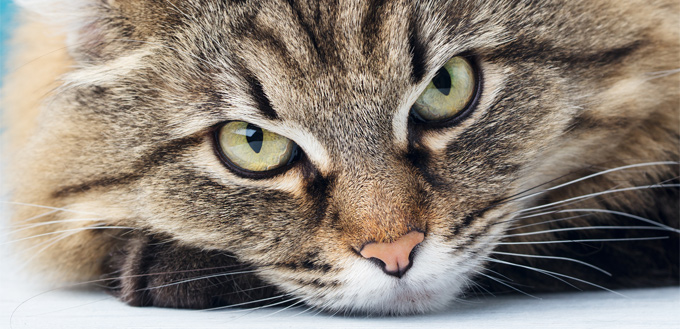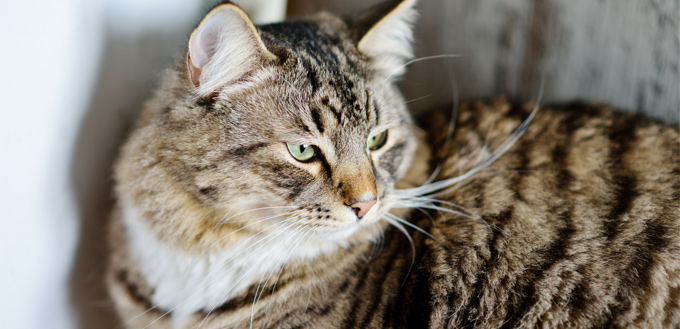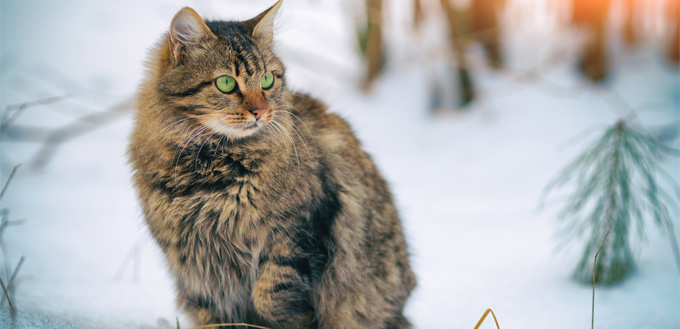Known for their luxurious fur and impressive agility, the Siberian is a popular choice with cat owners the world over. Although the breed originated in Russia, they can now be found in all sorts of places, and make excellent pets. The distinctive breed is distinguishable by its broad chest, wedge-shaped face, and tipped ears, along with a thick, lustrous coat that makes them a pleasure to groom.
Whether you’re thinking of bringing a Siberian cat into your life, or simply want to know more about the breed, we’ve got you covered. Below we work our way through everything you need to know about these felines, so you can decide if this is the breed for you.

History of the Siberian Cat
No one knows exactly how far back the Siberian breed goes, but it can be traced to at least the 1700s, whilst records of similar animals go back as far as 1,000 CE. Siberian cats even feature in a number of Russian folk tales (or should we say folk tails?) As its name suggests, this breed has its roots in the forests of Siberia, where its powerful frame and warm coat helped to protect it against the demands of a harsh cold climate.
Around the eighteenth century, it is thought that Russian emigrants heading to Europe brought the Siberian cat with them, where it has flourished as a pet and companion. One well-known account of the breed appears in Harrison Wier’s 1889 work, Our Cats and All about Them. Wier is widely regarded as one of the first cat fanciers – for the Siberian cat to catch his attention was high praise indeed!
It wasn’t until much later that the breed was introduced to America. In 1990, a Louisiana breeder named Elizabeth Terrell traded four of her Himalayan cats for three Siberians in an exchange with a St. Petersburg trader. Terrell brought these cats back to the US, where she painstakingly worked to establish the breed.
Although Siberian cats are still relatively rare – especially in America – they have caught the attention of the cat-lover community in recent years because of their supposedly hypoallergenic properties. Although no cat can truly be called ‘hypoallergenic’, their coats do contain less of the Fel D1 allergen which triggers many cat allergies. Because of this, people with milder allergies can typically tolerate Siberian cats better than other breeds. Nonetheless, whether or not these cats are suitable should be determined on a case by case basis. If you or a member of your household does suffer from allergies, it’s a good idea to spend some time around a Siberian cat before you commit to one, to ascertain whether they will trigger a reaction.
Quick Facts About the Siberian Cat
Siberian cats are a unique breed – below are our top ten facts about these fascinating felines:
- Siberian cats are colloquially known as the ideal cat for dog-lovers, due to their loyal and affectionate personalities.
- Siberian cats are commonly considered to be the largest domestic cat breed. They can weigh up to 17 pounds and sometimes more!
- A Siberian’s coat consists of three layers and is waterproof – perfect for surviving in the icy depths of the Russian forest!
- Despite their large size, Siberian cats are known for their agility – particularly when it comes to jumping ability. Their strong back legs are slightly longer than their front legs, allowing them to soar to heights unheard of in other breeds.
- Siberian cats tend to be excellent hunters compared to other domesticated breeds.
- Because of their high intelligence, Siberian cats are one of the easiest breeds to teach tricks.
- Siberian cats can be found in a veritable rainbow of colors, from black or white, to tan and brown.
- Unlike most cats, Siberians are often fascinated by water. The fact that water holds such an appeal for them may be down to their waterproof coats.
- Siberian cats are sometimes known as Siberian forest cats or Moscow Longhairs
- Siberian cats are hopeless romantics and tend to form strong bonds, often choosing one mate for life

Things You Should Know
A few key things to bear in mind with this breed
Health
Each cat is unique, hence more or less susceptible to their own set of health issues. However, Siberian cats tend to be more prone to certain ailments than other breeds:
- Hypertrophic cardiomyopathy (HC)
This condition is a type of heart disease, characterised by inflammation of the heart. In some cats, this condition is symptom free, but in more severe cases it can cause vomiting, labored breathing, and lethargy. When choosing your Siberian kitten, it is a good idea to check with the breeder that the cat’s line does not have a history of HC, as the cause is largely genetic.
- Pyruvate Kinase (PK) Deficiency
Siberian cats also have a higher than average tendency to KP deficiency. KP is a type of enzyme involved in the functioning of red blood cells. When a cat’s body does not produce enough KP, serious problems can arise, as oxygen is not being transported to vital organs as efficiently as it should be. This can lead cats to develop anaemia and other blood-related conditions. This condition is hereditary, which is why certain breeds of cat are particularly prone. As well as Siberians, the Abyssinian, Maine Coon, and Savannah cats are also more likely to develop this condition. Below are some common symptoms of KP deficiency to look out for in your feline:
- Lethargy or general weakness
- Pale gums
- Muscle wastage
- Elevated heart rate
- Anemia
Before buying a Siberian cat, check with the breeder whether the genetic line has a history of this illness.
Feeding
Like all cats, Siberians are natural carnivores, and a meat-rich diet comes closest to what they would have eaten prior to domestication. You can feed your Siberian a ‘natural’ diet of chicken, lamb, pork, and beef, boiled or even raw. If you do decide on a raw meat diet, freeze the meat first to prevent the growth of any harmful microbes. Bear in mind that young, healthy cats can manage larger pieces of meat than you might think – their teeth are designed to tear meat apart, and doing so helps to keep them in good condition. Of course, this diet is not suitable for all owners, and the alternative is to turn to commercial cat food. Experts on Siberian cats recommend that you choose a wet cat food rather than kibbles, to ensure your pet has adequate water. It’s also a good idea to seek out a food with as high an animal protein content as possible, and avoid foods which contain high proportions of grains and vegetables, as these are not found in natural feline diets. An average Siberian cat will need to eat around 7 ounces (200 grams) of food each day.
Care
Siberian cats can be the ideal pet – adorable, loyal, and playful. Like any pet, though, they are a significant commitment, which should not be undertaken lightly. Below we outline some key care advice to bear in mind when considering adopting one of these animals.
- Mental Stimulation
Siberian cats are equipped with sharp wit – probably developed over thousands of years working out survival strategies in the frozen forests of Russia! In the somewhat less extreme environs of the average home, this intellectual capacity must be redirected. It’s important to give your Siberian cat plenty of mental stimulation, whether through cat toys, play, or puzzles. You can even teach a Siberian cat tricks in the same way you would teach a dog! They can learn to sit, shake hands, lie down, or give you a high five – and this is just the tip of the iceberg. Like dogs, many Siberian cats will also enjoy a game of fetch!
Related Post: Best Cat Toys
- A Playmate
Because Siberian cats are such bold and sociable animals, they suffer when left alone for long periods. If you don’t spend much time at home, you may wish to consider a more independent breed, or adopting another pet at the same time. Siberian cats will happily get along with dogs as well as other cats, so the type of animal you choose can vary. If you do decide to adopt a lone Siberian cat, be sure to engage with them as much as possible when you’re at home. They thrive on company and love to receive affection.
- Indoors or Outdoors?
One question you will need to answer when adopting a Siberian cat is whether they will be an indoor or outdoor pet. Both lifestyles have their benefits and drawbacks, and which one you choose will very much depend on where you live. For you suburb and country dwellers, letting your Siberian roam free may be best, provided the traffic is quiet enough. Adapted to hunting in the wild, access to outdoor space allows these cats the physical exercise they need, as well as the mental stimulation that is part and parcel of exploration. For city dwellers, though, indoors may well be best – especially if you live on a high floor. Busy roads pose a serious risk for your cat, and rare breeds like the Siberian may also be vulnerable to kidnappings. To make sure your cat doesn’t miss out on fresh air and exercise you can invest in a harness and take them out to a local park now and then. Because Siberian cats are so confident, the new sounds, sights and smells are not likely to phase them. If you introduce them to the park from a fairly young age, and teach them to come back when called, you should even be able to let them off their harness for a time. Just remember to kit out your pet with a name tag, in case they manage to wander off.
- The perfect temperature
Because of their thick coats, designed to withstand some of the bitterest winters on the planet, Siberian cats do not react well to heat! If you adopt one of these furry felines, be sure you don’t expose them to temperatures over 91 degrees Fahrenheit (33 degrees Celsius). If you live in a hot climate, this could mean keeping your cat indoors for much of the year, so consider carefully whether a Siberian is the best option for you. In colder climates, this intolerance is a boon, as your cat will be able to explore the great outdoors happily even when winter rolls around.
Grooming
You might expect such a patently hairy breed to require constant hair-dressing attention, but this is actually quite far from the truth! Like most cats, Siberians shed their fur year-round, but especially so in the spring and fall, as temperature changes trigger the growth of a new coat. During these periods of moulting, you may need to brush your cat daily, but for the rest of the year once or twice a week will suffice. This regular brushing ensures that no knots or tangles form in your pet’s fur. These are not only uncomfortable, but can also cause real problems if left unattended, including the formation of matted areas, which can tug at the skin and become irritated.
Regular brushing not only helps your cat to shed their coat, but it also removes dead skin cells, stimulates blood flow, and improves the overall condition of their skin. We previously put together a handy guide to cat grooming, which explains how to groom your feline friend properly, and why it’s so important. For Siberian and other long-haired cats, in particular, try the following tips:
- When brushing your cat’s abdomen and legs, work upwards, towards their head
- Brush down their back towards their tail, which itself should be brushed from centre to side as if it had a parting
- Brush the hair on your cat’s front upward towards their neck
- Talcum powder can be used to tease out knots; simply sprinkle a little on the affected area and gently pull the knot apart with your fingers
- For any knots or mats, you can’t remove, seek the assistance of a professional groomer, as tangled coats can be uncomfortable and pose a more serious problem if left unattended
- Bathe your cat every now and then – but not too often, as even gentle shampoo designed for cats can strip away vital oils if used too frequently. These oils are important in regulating your cat’s temperature and keeping their skin healthy.

Related Post: Best Cat Brush
Temperament
Siberian cats are known for being more affectionate than other breeds. Many enthusiasts insist that, in temperament, they are more comparable to dogs than other cats! Siberians are generally easy-going animals, who will get along with other members of the household no matter what their size and species:
- Owners
Siberian cats are inquisitive and sociable creatures, who like to spend as much time with their human companions as they can. Owners report their felines ‘helping’ them with various household tasks, and moving from room to room as they do. Despite this, it would be remiss to describe Siberian cats as needy or clingy – although they enjoy being at the heart of the household action, they tend to wait patiently until you have time to give them the attention and affection they need.
- Children
Because of their placid nature, Siberian cats are a great option for households with children. Whilst other breeds can quickly lash out if kids begin to bother them, the more human-oriented Siberian is much more likely to remain calm, and even feel protective of the smaller humans in their tribe.
- Other Pets
Unlike many cats, Siberians are happy to peacefully coexist with their canine counterparts. They may even feel inclined to play with dogs, and because of their high intelligence and aptitude for learning tricks, you could even train them side by side! As mentioned earlier, Siberian cats prefer to have company, so are an excellent addition to households which already have pets.
Choosing a Siberian Kitten
You can expect a Siberian kitten to cost between $1,300 and $1,600, assuming you choose one from a good quality breeder. Of course, personal choice will be a huge factor when picking out your pet, but there are also some key health indicators that should be borne in mind when choosing your new Siberian kitten:
- Being lively and energetic
- Clear eyes
- Healthy-looking coat
- Ears which are clean and free of discharge
The sex you choose can also have a bearing on your cat’s personality. Female Siberian cats tend to be more independent and territorial, so can be a good option if you don’t have a lot of time to spend on them. Males, on the other hand, tend to be more affectionate and interested in the human company. Of course, whether these generalisations hold up to inspection will vary between individual cats, but they are worth bearing in mind nonetheless.
Read here our New Cat Cheat Sheet.
Sources:
- Tori Houle, The Siberian, Pet Health Network
- Siberian, VCA Hospitals
More Pet Product Reviews
Heated Cat Beds
Cat Collars
Cat Costumes
Cat Doors
Laser Pointers for Cats
Cat Litter Boxes
Cat Condos for Kitties
Cat Window Perches
Cat Litter
Interactive Cat Toys






